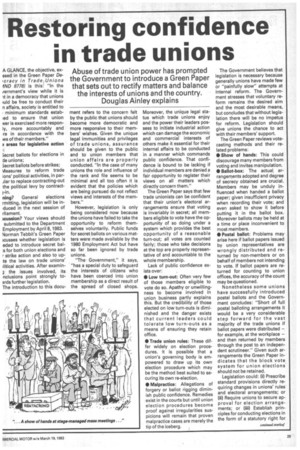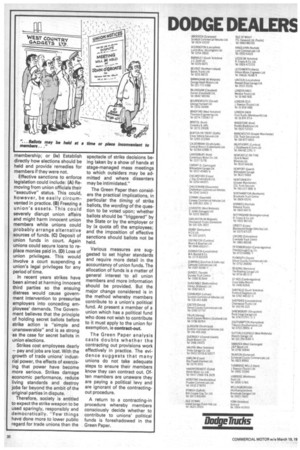Restoring confidence in trade unions
Page 31

Page 32

If you've noticed an error in this article please click here to report it so we can fix it.
Abuse of trade union power has prompted the Government to introduce a Green Paper that sets out to rectify matters and balance the interests of unions and the country. Douglas Ainley explains
A GLANCE, the objective, exssed in the Green Paper Deicracy in Trade Unions IND 8778) is this: "In the fernment's view while it is It in a democracy that unions uld be free to conduct their n affairs, society is entitled to minimum standards estabred to ensure that union tiler is exercised more responly, more accountably and re in accordance with the ws of their members."
areas for legislative action iecret ballots for elections in de unions; 3ecret ballots before strikes; ■ Aeasures to reform trade ions' political activities, in parAar to replace contracting-out the political levy by contractj-in.
ning? General elections rmitting, legislation will be induced in the next session of rliament.
mussion? Your views should submitted to the Department Employment by April 8,1983. Norman Tebbit's Green Paper ;cusses whether legislation is eded to introduce secret bal:s for both union elections and r strike action and also to upte the law on trade unions'
■ litical activities. After examinthe issues involved, its nclusions point strongly toi-ds further legislation.
The introduction to this docu ment refers to the concern felt by the public that unions should become more democratic and more responsive to their members' wishes. Given the unique legal immunities and privileges of trade unions, assurance should be given to the public and to union members that union affairs are properly conducted. "In the case of many unions the role and influence of the rank and file seems to be minimal and all too often it is evident that the policies which are being pursued do not reflect views and interests of the members."
However, legislation is only being considered now because the unions have failed to take the opportunity to reform themselves voluntarily. Public funds for secret ballots on various matters were made available by the 1980 Employment Act but have so far been ignored by trade unions.
"The Government," it says, "has a special duty to safeguard the interests of citizens who have been coerced into union membership as a direct result of the spread of closed shops. Moreover, the unique legal status which trade unions enjoy and the power their leaders possess to initiate industrial action which can damage the economic and commercial interests of others make it essential for their internal affairs to be conducted in a manner which commands public confidence. That confidence is bound to be lacking if individual members are denied a fair opportunity to register their views on all matters which directly concern them."
The Green Paper says that few trade unionists can be confident that their union's electoral arrangements ensure that voting is invariably in secret; all members eligible to vote have the opportunity of so doing under a system which provides the best opportunity of a reasonable turn-out; all votes are counted fairly; those who take decisions at the top are properly representative of and accountable to the whole membership.
Lack of public confidence exists over: • Low turn-out: Often very few of those members eligible to vote do so. Apathy or unwillingness to become involved in union business partly explains this. But the credibility of those elected on low turn-outs is diminished and the danger exists that current leaders could tolerate low turn-outs as a means of ensuring they retain office.
• Trade union rules: These differ widely on election procedures. It is possible that a union's governing body is empowered to draw up its own election procedure which may be the method best suited to securing its own re-election.
• Malpractice: Allegations of forgery or ballot rigging diminish public confidence. Remedies exist in the courts but until union election procedures become proof against irregularities suspicions will remain that proven malpractice cases are merely the tip of the iceberg. The Government believes that legislation is necessary because generally unions have made few or "painfully slow" attempts at internal reform. The Government stresses that voluntary reform remains the desired aim and the most desirable means, but concludes that without legislation there will be no impetus for reform. Legislation should give unions the chance to act with their members' support.
The Green Paper reviews votecasting methods and their related problems: • Show of hands: This could discourage many members from voting and invites manipulation.
• Ballot-box: The actual arrangements adopted and degree of secrecy obtained are crucial. Members may be unduly influenced when handed a ballot paper; given insufficient privacy when recording their vote; and even asked to show it before putting it in the ballot box. Moreover ballots may be held at a time or place inconvenient to most members.
• Postal ballot: Problems may arise here if ballot papers issued by union representatives are wrongly distributed and returned by non-members or on behalf of members not intending to vote. If ballot papers are returned for counting to union offices, the accuracy of the count may be questioned.
Nonetheless some unions have successfully introduced postal ballots and the Government concludes: "Short of full postal balloting arrangements it would be a very considerable step forward for the vast majority of the trade unions if ballot papers were distributed — for example, at the workplace — and then returned by members through the post to an independent scrutineer." Given such arrangements the Green Paper indicates that the block vote, system for union elections should not be retained.
Legislation could: (i) Prescribe standard provisions directly requiring changes in unions' rules and electoral arrangements; or (li) Require unions to secure approval for election arrangements; or (iii) Establish principles for conducting elections in the form of a statutory right for membership; or (iv) Establish directly how elections should be held and provide remedies for members if they were not.
Effective sanctions to enforce legislation could include: (A) Removing from union officials their "executive" status. This could, however, be easily circumvented in practice. (B) Freezing a union's assets. This could severely disrupt union affairs and might harm innocent union members while unions could probably arrange alternative sources of funds. (C) Deposit of union funds in court. Again unions could secure loans to replace monies paid in. (D) Loss of union privileges. This would involve a court suspending a union's legal privileges for any period of time.
In recent years strikes have been aimed at harming innocent third parties so the ensuing distress would cause government intervention to pressurise employers into conceding employees' demands. The Government believes that the principle of holding secret ballots before strike action is "simple and unanswerable" and is as strong as the case for secret ballots in union elections.
Strikes cost employees dearly — pay and jobs are lost. With the growth of trade unions' industrial power, the effects of exercising that power have become more serious, Strikes damage economic performance, reduce living standards and destroy jobs far beyond the ambit of the original parties in dispute.
Therefore, society is entitled to expect the strike weapon to be used sparingly, responsibly and democratically. "Few things have done more to lower public regard for trade unions than the spectacle of strike decisions being taken by a show of hands at stage-managed mass meetings to which outsiders may be admitted and where dissenters may be intimidated."
The Green Paper then considers the practical implications, in particular the timing of strike ballots, the wording of the question to be voted upon; whether ballots should be "triggered" by the State or by the employer or by (a quota of) the employees; and the imposition of effective sanctions should ballots not be held.
Various measures are suggested to set higher standards and require more detail in the accountancy of union funds. The allocation of funds is a matter of general interest to all union members and more information should be provided. But the major change considered is in the method whereby members contribute to a union's political fund. At present a member of a union which has a political fund who does not wish to contribute to it must apply to the union for exemption, ie contract-out.
The Green Paper analysis casts doubts whether the contracting out provisions work effectively in practice. The evid e nce suggests that many unions do not take adequate steps to ensure their members know they can contract out. Often members are unaware they are paying a political levy and are ignorant of the contractingout procedure.
A return to a contracting-in procedure whereby members consciously decide whether to contribute to unions' political funds is foreshadowed in the Green Paper.












































































































